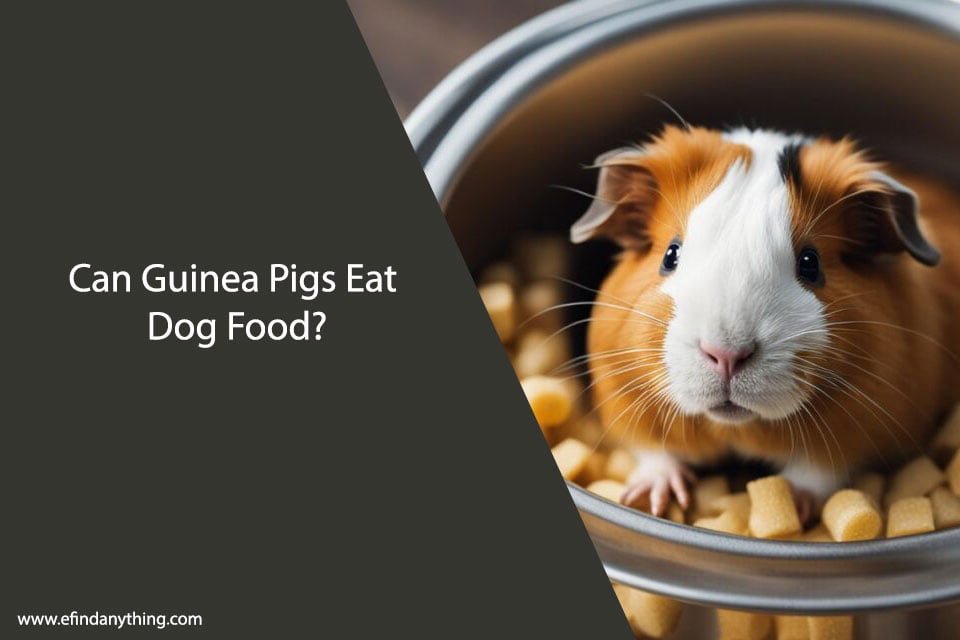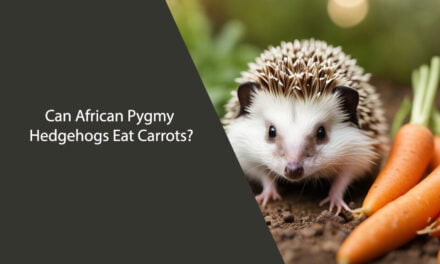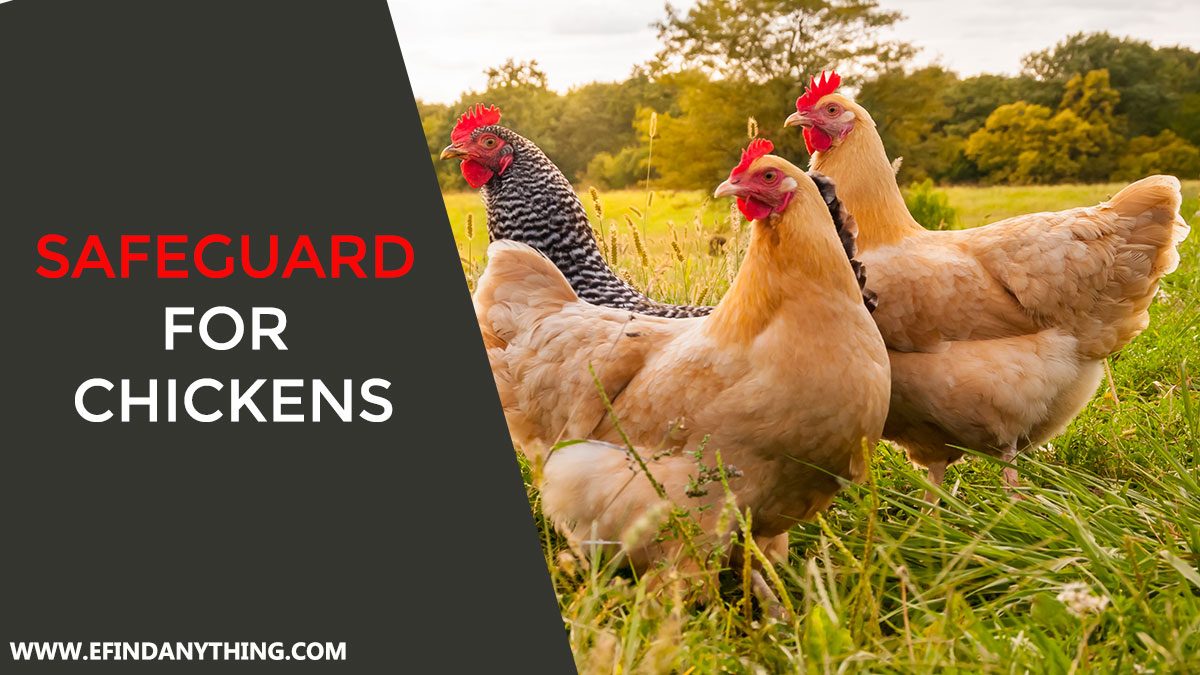Guinea pigs are adorable and beloved pets that require a balanced and nutrient-rich diet to maintain their health. While there are plenty of commercial guinea pig foods available, some pet owners may wonder if it’s okay to supplement their diet with dog food. After all, it’s convenient to have a single type of food for all pets in the household. But can guinea pigs eat dog food?
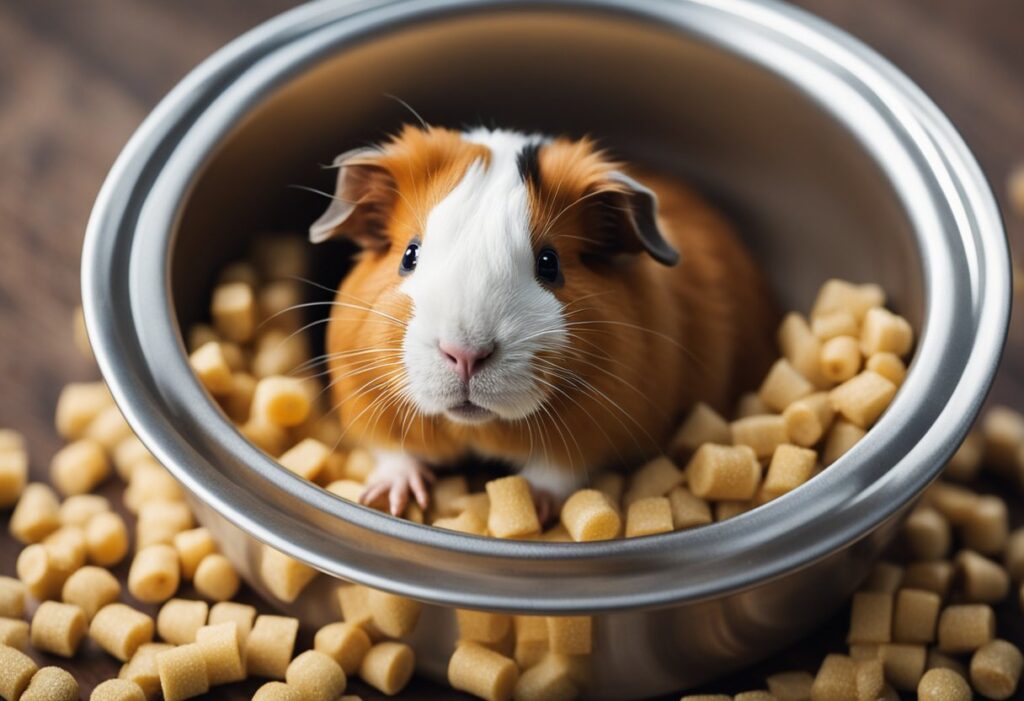
The answer is no, guinea pigs should not eat dog food. While dogs and guinea pigs may share some similarities in their dietary requirements, they have different nutritional needs. Dog food is formulated to meet the needs of dogs, which have a different digestive system and metabolism compared to guinea pigs. Feeding your guinea pig dog food can lead to nutritional imbalances and health problems.
Table of Contents
Dietary Basics for Guinea Pigs
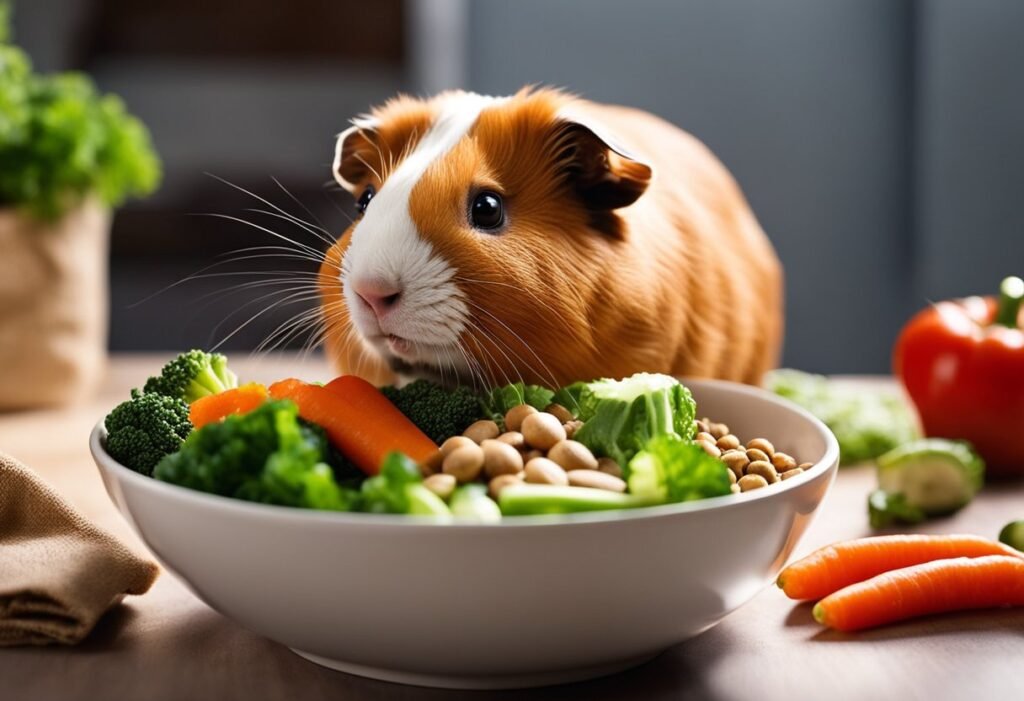
As responsible pet owners, it is our duty to ensure that our guinea pigs receive a healthy and balanced diet. Guinea pigs are herbivores, which means that their diet should consist mainly of hay, fresh vegetables, and fruits. It is important to note that guinea pigs have specific dietary requirements that differ from other animals, including dogs.
Guinea pigs require a diet that is high in fiber and vitamin C. They cannot produce their own vitamin C, so it is important to provide them with a diet that includes foods rich in this essential nutrient. Fresh vegetables such as kale, parsley, and bell peppers are excellent sources of vitamin C.
Hay should make up the majority of a guinea pig’s diet. It is important to provide them with fresh hay daily to ensure that they receive enough fiber. Timothy hay is a popular choice, but other types of hay such as orchard grass, meadow hay, and oat hay can also be fed to guinea pigs.
While it is important to provide a varied diet for guinea pigs, there are certain foods that should be avoided. Foods high in sugar, fat, and salt should be limited or avoided altogether. This includes dog food, which is not suitable for guinea pigs. Dog food is formulated for the nutritional needs of dogs and does not provide the necessary nutrients that guinea pigs require.
In conclusion, a healthy and balanced diet is essential for the well-being of our guinea pigs. By providing them with a diet that is high in fiber and vitamin C, and avoiding foods that are high in sugar, fat, and salt, we can ensure that our furry friends live happy and healthy lives.
Risks of Feeding Dog Food to Guinea Pigs

Feeding dog food to guinea pigs can be risky as it can lead to various health problems. Here are some of the risks associated with feeding dog food to guinea pigs:
Nutritional Mismatches
Dog food is formulated to meet the nutritional needs of dogs, which are different from those of guinea pigs. Guinea pigs require a diet that is high in fiber and vitamin C, while dog food is typically high in protein and fat. Feeding dog food to guinea pigs can lead to nutritional imbalances and deficiencies, which can cause health problems such as scurvy, diarrhea, and weight gain.
Potential Toxins
Dog food may contain ingredients that are toxic to guinea pigs. For example, some dog foods contain onions, garlic, or other ingredients that can be harmful to guinea pigs. Additionally, dog food may contain preservatives or additives that are not safe for guinea pigs. Feeding dog food to guinea pigs can lead to poisoning, which can cause symptoms such as vomiting, diarrhea, and lethargy.
Digestive System Differences
Guinea pigs have a different digestive system than dogs, which means that they are not able to digest certain ingredients that are found in dog food. For example, guinea pigs cannot digest bones or meat products, which are often found in dog food. Feeding dog food to guinea pigs can lead to digestive problems such as blockages or impactions, which can be life-threatening.
In conclusion, feeding dog food to guinea pigs can be risky and should be avoided. Guinea pigs require a diet that is specifically formulated for their nutritional needs, and feeding them dog food can lead to serious health problems. If you are unsure about what to feed your guinea pig, consult with a veterinarian or a qualified animal nutritionist.
Proper Diet for Guinea Pigs

Guinea pigs are herbivores, which means they require a diet that is rich in fiber, vitamin C, and low in fat. Feeding them a diet that is high in protein and fat can lead to health problems.
Recommended Foods
Hay should be the primary component of a guinea pig’s diet. Timothy hay, orchard grass, and meadow hay are all excellent choices. Fresh vegetables, such as kale, spinach, carrots, and bell peppers, should also be included in their diet. Fruits, such as apples, bananas, and strawberries, can be given occasionally as a treat.
Guinea pig pellets can also be included in their diet, but they should not be the primary source of food. When choosing pellets, look for ones that contain at least 18% fiber and less than 14% protein. Avoid pellets that contain seeds, nuts, or dried fruit.
Vitamin C Requirements
Guinea pigs cannot produce their own vitamin C, so it is important to provide them with a source of this essential nutrient. Fresh vegetables, such as bell peppers, kale, and broccoli, are excellent sources of vitamin C. Guinea pig pellets that are fortified with vitamin C can also be given, but it is important to check the expiration date to ensure that the vitamin C is still active.
In summary, a guinea pig’s diet should consist of hay, fresh vegetables, and a small amount of pellets. Fruits can be given occasionally as a treat. It is important to ensure that they are receiving enough vitamin C to prevent health problems. By following these guidelines, we can provide our guinea pigs with a healthy and balanced diet.
Safe Alternatives to Dog Food
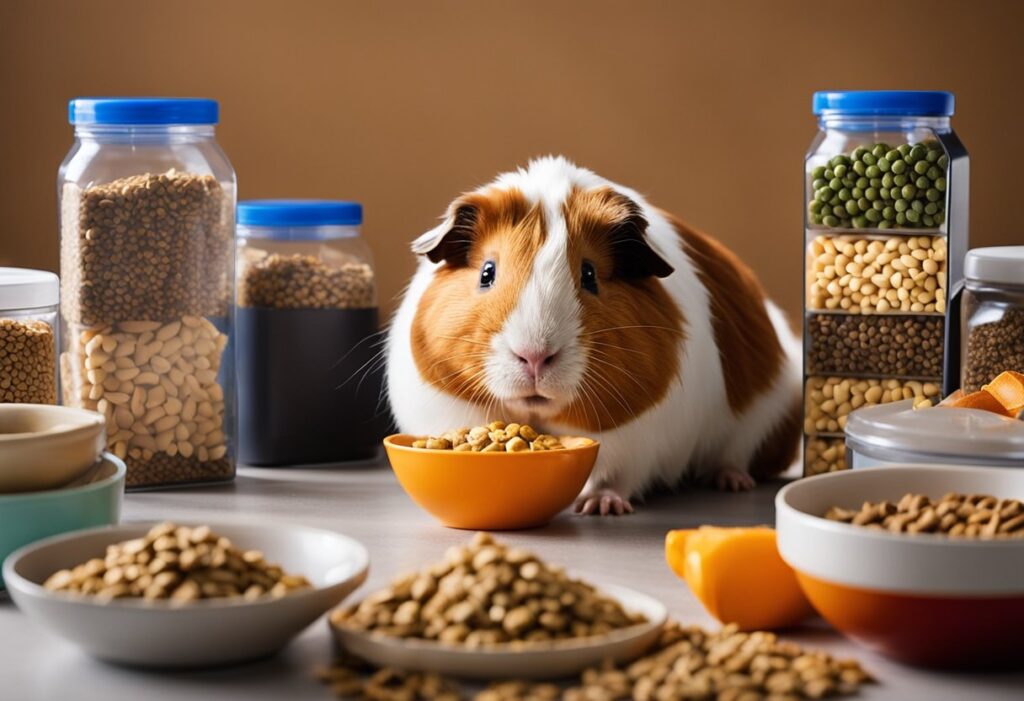
When it comes to feeding your guinea pig, it’s important to provide them with a balanced diet that meets their nutritional needs. While dog food may seem like a convenient option, it’s not recommended as a regular part of their diet. Instead, here are some safe alternatives to consider:
Vegetables and Fruits
Guinea pigs require a diet that’s high in fiber and vitamin C. Vegetables and fruits are a great source of both of these nutrients. Some safe options include:
- Bell peppers (red, green, and yellow)
- Broccoli
- Carrots
- Cucumber
- Kale
- Romaine lettuce
- Spinach
- Strawberries
It’s important to introduce new foods slowly and in small quantities to avoid upsetting their digestive system. Additionally, fruits should be given in moderation due to their high sugar content.
Commercial Guinea Pig Food
Commercial guinea pig food is specially formulated to meet their nutritional needs. Look for brands that have a high percentage of hay and include vitamin C. Avoid those that contain seeds, nuts, and dried fruit as they can be high in fat and sugar.
When feeding your guinea pig, always make sure they have access to clean water and fresh hay. By providing them with a balanced diet, you can help ensure their health and happiness.
Understanding Pet Food Labels
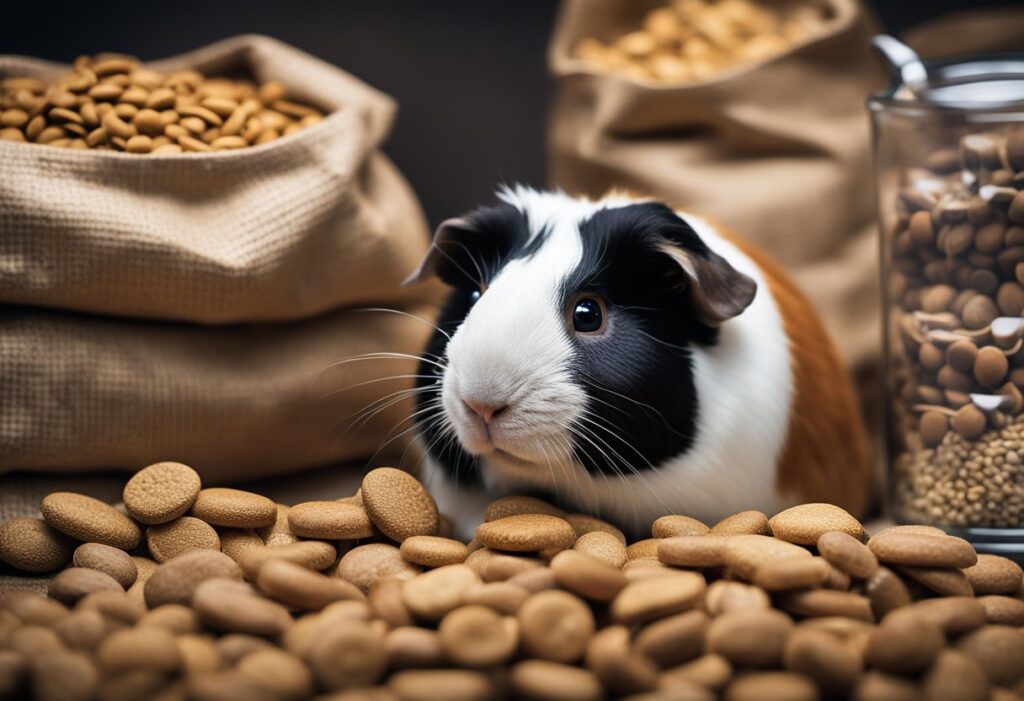
When it comes to feeding our pets, it’s important to understand the ingredients in their food. Reading pet food labels can be overwhelming, but it’s essential to ensure that our pets are getting the nutrients they need. In this section, we’ll discuss the key aspects of pet food labels and what to look for.
Ingredients to Avoid
Some ingredients in pet food can be harmful to our pets. It’s important to be aware of these ingredients and avoid them. Here are some ingredients to watch out for:
- Artificial preservatives: BHA, BHT, ethoxyquin, and propyl gallate are artificial preservatives that can be harmful to our pets. These preservatives have been linked to cancer and other health problems.
- By-products: By-products are the parts of animals that are not used for human consumption, such as organs, beaks, and feet. By-products can be low-quality and may contain harmful bacteria.
- Fillers: Fillers are ingredients that add bulk to pet food but provide little nutritional value. Common fillers include corn, wheat, and soy. These ingredients can be hard for pets to digest and may cause allergies.
Nutritional Analysis
Pet food labels must include a nutritional analysis that lists the percentage of protein, fat, and fiber in the food. It’s important to look for a balanced diet that meets our pet’s nutritional needs. Here are some things to consider:
- Protein: Cats and dogs need a diet high in protein. Look for a food that lists a high percentage of protein from animal sources.
- Fat: Fat is an important energy source for pets. Look for a food that lists a moderate amount of fat.
- Fiber: Fiber is important for digestive health. Look for a food that lists a moderate amount of fiber.
In conclusion, understanding pet food labels is essential for ensuring that our pets are getting the nutrients they need. By avoiding harmful ingredients and looking for a balanced diet, we can help keep our pets healthy and happy.
Emergency Feeding Situations
In emergency situations, it may be necessary to feed your guinea pig dog food. However, it is important to note that dog food should not be a regular part of their diet as it does not provide all the necessary nutrients they need.
If you find yourself in a situation where you need to feed your guinea pig dog food, here are some tips to keep in mind:
- Choose a high-quality dog food that is low in fat and protein. Look for a brand that contains whole grains and vegetables.
- Avoid dog foods that contain meat by-products, artificial preservatives, and fillers such as corn and soy.
- Mix the dog food with fresh vegetables and fruits to provide a balanced diet.
- Feed your guinea pig small amounts of dog food at a time to prevent digestive upset.
- Always provide fresh water and hay for your guinea pig to ensure they stay hydrated and receive enough fiber.
Remember, dog food should only be used as a last resort in emergency situations. If possible, it is best to provide your guinea pig with a balanced diet of hay, fresh vegetables, and a high-quality guinea pig pellet.
Consulting with a Veterinarian
When it comes to feeding your guinea pig, it’s always best to consult with a veterinarian to ensure that you are providing them with a balanced and healthy diet. This is especially true if you are considering feeding your guinea pig dog food.
A veterinarian can help you determine if dog food is a suitable addition to your guinea pig’s diet based on their individual needs and overall health. They can also advise you on the appropriate amount of dog food to feed your guinea pig, as well as any potential risks or concerns associated with feeding them dog food.
Additionally, a veterinarian can help you identify any signs of nutritional deficiencies or health problems that may arise from feeding your guinea pig dog food. They can also provide guidance on other types of food that may be beneficial for your guinea pig, such as fresh fruits and vegetables.
Overall, consulting with a veterinarian is an important step in ensuring that your guinea pig is receiving the proper nutrition and care they need to thrive.
Frequently Asked Questions
What are the health risks of feeding dog food to guinea pigs?
Feeding dog food to guinea pigs can be harmful to their health. Dog food is formulated for dogs and contains different nutrients and ingredients that may not be suitable for guinea pigs. Some dog foods may contain high levels of protein, fat, or other ingredients that can cause digestive problems or other health issues in guinea pigs.
What should be included in a guinea pig’s daily diet?
A guinea pig’s daily diet should consist of hay, fresh vegetables, and a small amount of pellets. Timothy hay is the best type of hay for guinea pigs, and they should have access to it at all times. Fresh vegetables such as leafy greens, bell peppers, and carrots should also be included in their diet. Pellets should be given in small amounts, and the brand and type of pellets should be chosen carefully to ensure that they contain the necessary nutrients.
Which vegetables are safe for guinea pigs to consume?
Guinea pigs can safely consume a variety of vegetables, including leafy greens such as kale, spinach, and romaine lettuce. Other safe vegetables include bell peppers, carrots, cucumbers, and zucchini. However, some vegetables such as onions, garlic, and potatoes are toxic to guinea pigs and should be avoided.
Are there any specific foods that are toxic to guinea pigs?
Yes, there are several foods that are toxic to guinea pigs and should be avoided. These include chocolate, caffeine, alcohol, avocado, onions, garlic, potatoes, rhubarb, and tomato leaves. Additionally, any food that is high in sugar or fat can cause digestive problems and should be given in moderation or avoided altogether.
Can guinea pigs have any meat-based products?
No, guinea pigs are herbivores and should not be given any meat-based products. Their digestive systems are not designed to process meat, and it can cause digestive problems and other health issues.
What is considered a healthy treat for a guinea pig?
A healthy treat for a guinea pig can be a small piece of fruit such as a slice of apple or a few blueberries. However, treats should be given in moderation and should not make up a significant portion of their diet. Avoid giving them treats that are high in sugar or fat, as they can cause digestive problems and other health issues.

